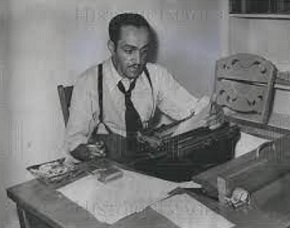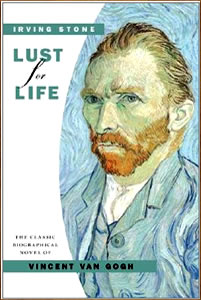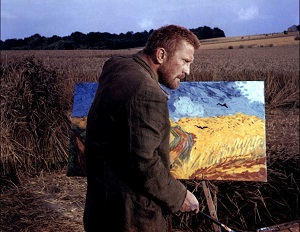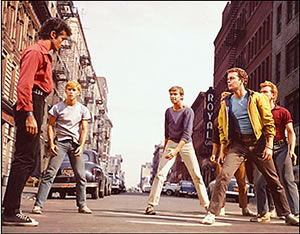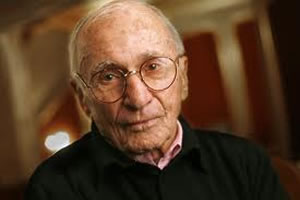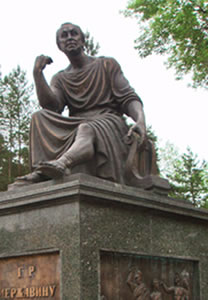De Russische dichter Gavrila Romanovitsj Derzjavin werd geboren in Kazan op 14 juli 1743. Zie ook alle tags voor Gavrila Derzjavin op dit blog.
On The Death Of Prince Meshchersky (Fragment)
O, Voice of time! O, metal’s clang!
Your dreadful call distresses me,
Your groan doth beckon, beckon me
It beckons, brings me closer to my grave.
This world I’d just begun to see
When death began to gnash her teeth,
Like lightening her scythe aglint,
She cuts my days like summer hay.
No creature thinks to run away,
From under her rapacious claws:
Prisoners, kings alike are worm meat,
Cruel elements the tomb devour,
Time gapes to swallow glory whole.
As rushing waters pour into the sea,
So days and ages pour into eternity
And death carnivorous all eats.
We slide along the edge of an abyss
And we will someday topple in.
With life, we take at one time death,
To die’s the purpose of our birth.
Death strikes all down without a thought.
It shatters e’en the stars,
Extinguishes the suns,
It threatens every world.
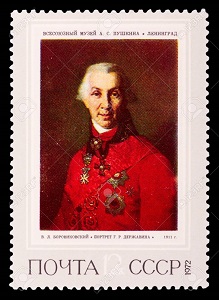
Op een postzegel uit 1972
De Franse schrijfster van Belgische origine Béatrix Beck werd geboren in Villars-sur-Ollon op 14 juli 1914. Zie ook alle tags voor Béatrix Beck op dit blog.
Uit: La Petite Italie
“Au
dernier étage, dans un placard à balais coquettement aménagé, tapissé
d’échantillons de papier mural, vivotait la très vieille signora Cumini,
trois fois veuve et plus de dents. Elle dormait recroquevillée pour
pouvoir fermer sa porte. On la nourrissait gratis, les uns par
solidarité sociale, les autres pour l’amour de la bienheureuse Maria
Goretti, la grande Teresa ou, carrément, Dieu.
— Du pareil au même, chuintait Lucrezia Cumini.
Lait
de poule, purées de toutes choses, même gâtées, elle n’y voit que du
feu. Consommé où le chat mijote trois heures et demie, c’est pas la mort
d’un pape. Avec les herbes, un vrai lapin. La nonagénaire Lulu
larmoyait d’attendrissement en déglutissant.
Alida étreignit sa fille comme si elle venait d’échapper à un carnage,
coiffa de sa belle grande main abîmée la tête ronde de son fils, rasée à
cause des poux des riches :
— Mon cœur, qu’est ce que t’as fait à l’école aujourd’hui ?
— Rien.
— Oh, protesta Alia. Ils ont appris une chanson. Chante à maman.
— La pou-oule noire pond dans l’a-armoire.
— Et puis ?
— La poule blanche je sais pas.
La
toute petite Sandra donna de la voix. Mère et fille se jetèrent sur
elle, l’arrachèrent à son moïse, se l’arrachèrent. Alida dut lâcher
prise pour touiller la sublime soupe des premiers jours du mois, une
totalité, un absolu. Dans chaque assiette un filet d’or liquide. Mon
huile c’est mon sang, disait Alida en rebouchant serré le bidon. Fête
intérieure, recueillement. Seigneur, priait in petto Alida, mange avec
nous cette bonté.
Quand
le travail venait à manquer, on allait jusqu’à bouffer de l’herbe bien
bouillie, bien tordue, bien hachée. Les macaronis vivent de l’air du
temps, disaient les Français, les gaspilleurs, avec envie et mépris.
Après
le repas, succulent ou misérable, les trois enfants baisaient la main
de leur mère qui l’avait préparé, l’hommage de Nicola tenant plutôt du
suçon. Alida accueillait le cérémonial avec naturel et dignité. Essayait
de raconter à son mari : — La voisine… le boulanger… la pluie… —
Les ragots j’en ai rien à foutre. Parle-moi de la dictature du
prolétariat.”
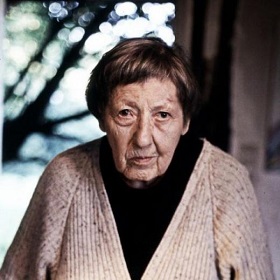
De Amerikaanse schrijver, scenarioschrijver en regisseur Arthur Laurents is geboren in New York op 14 Juli 1918.Zie ook alle tags voor Arthur Laurents op dit blog.
Uit: West Side Story
“By
the time the mambo music starts the Jets and Sharks are each on their
own side of the hall. At the climax of the dance, Tony and Bernardo’s
sister, Maria, see one another :as a delicate cha-cha-cha, they slowly
walk forward to meet each other.
MEETING SCENE
TONY
You’re not thinking I’m someone else?
MARIA
I know you are not.
TONY
Or that we have met before?
MARIA
I know we have not.
TONY
I felt I knew something-never-before was going to happen, had to happen. But this is …
MARIA
interrupting
My hands are so cold.
He takes them in his.
Yours too.
He moves her hands to his face.
So warm.
She moves his hands to herface.
TONY
Yours, too…
MARIA
But of course. They are the same.
TONY
It’s so much to believe. You’re not joking me?
MARIA
I have not yet learned how to joke that way.
I think how I never will.
[JUMP]
Bernardo
is upon them in an icy rage. Chino, whom Bernardo has brought Maria
from Puerto Rico to marry, takes her home. Riff wants Bernardo for”War
Council”; they agree to meet in half an hour at Doc’s drugstore.”
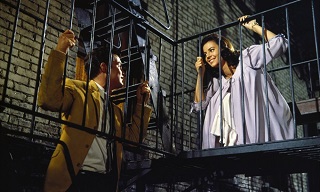
Scene uit de film uit 1961 met Natalie Wood (Maria) and Richard Beymer (Tony)
De Amerikaanse schrijver Owen Wister werd geboren op 14 juli 1860 in Germantown, Pennsylvania. Zie ook alle tags voor Owen Wister op dit blog.
Uit: The Jimmyjohn Boss
“One
day at Nampa, which is in Idaho, a ruddy old massive jovial man stood
by the Silver City stage, patting his beard with his left hand, and with
his right the shoulder of a boy who stood beside him. He had come with
the boy on the branch train from Boise, because he was a careful German
and liked to say everything twice–twice at least when it was a matter
of business. This was a matter of very particular business, and the
German had repeated himself for nineteen miles. Presently the east-bound
on the main line would arrive from Portland; then the Silver City stage
would take the boy south on his new mission, and the man would journey
by the branch train back to Boise. From Boise no one could say where he
might not go, west or east. He was a great and pervasive cattle man in
Oregon, California, and other places. Vogel and Lex–even to-day you may
hear the two ranch partners spoken of. So the veteran Vogel was now
once more going over his notions and commands to his youthful deputy
during the last precious minutes until the east-bound should arrive.
“Und
if only you haf someding like dis,” said the old man, as he tapped his
beard and patted the boy, “it would be five hoondert more dollars salary
in your liddle pants.”
The
boy winked up at his employer. He had a gray, humorous eye; he was slim
and alert, like a sparrow-hawk–the sort of boy his father openly
rejoices in and his mother is secretly in prayer over. Only, this boy
had neither father nor mother. Since the age of twelve he had looked out
for himself, never quite without bread, sometimes attaining champagne,
getting along in his American way variously, on horse or afoot, across
regions of wide plains and mountains, through towns where not a soul
knew his name. He closed one of his gray eyes at his employer, and
beyond this made no remark.
“Vat you mean by dat vink, anyhow?” demanded the elder.
“Say,”
said the boy, confidentially–“honest now. How about you and me? Five
hundred dollars if I had your beard. You’ve got a record and I’ve got a
future. And my bloom’s on me rich, without a scratch. How many dollars
you gif me for dat bloom?” The sparrow-hawk sailed into a freakish
imitation of his master.
“You
are a liddle rascal!” cried the master, shaking with entertainment.
“Und if der peoples vas to hear you sass old Max Vogel in dis style they
would say, ‘Poor old Max, he lose his gr-rip.’ But I don’t lose it.”
His great hand closed suddenly on the boy’s shoulder, his voice cut
clean and heavy as an axe, and then no more joking about him. “Haf you
understand that?” he said.”
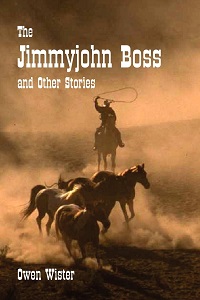
Cover
De Amerikaanse schrijver Willard Frances Motley werd geboren op 14 juli 1909 in Chicago. Zie ook alle tags voor Willard Motley op dit blog.
Uit: Alan M. Wald.American Night: The Literary Left in the Era of the Cold War (Hoofdstuk over Willard Motley)
“Like Oscar Wilde, Motley yearned for an escape from moralistic prohibi-tionism, but unlike Wilde he would not turn victimization into martyrdom. In personal notes he kept for a planned book-length novel about homosexual culture in the postwar era, he explained that he did not want to write the kind of book later known as the “Homosexual Problem Novel”; he hated the ones he read such as Gore Vidal’s The Pillar and the City (1946).107 He also refused to depict a homosexual as a redemptive figure, as in James Baldwin’s Another Country (1962). While Motley’s rejection of the available racial and gender definitions makes sense in a pre-Stonewall age, the absence of an alternative turned into a no-win predicament. Rather than producing fiction that replaced settled forms of identity with processes embedded in class, national, ethnic, and personal contexts, Motley could generate only a disconcerting sequence of enigmas and stereotypes. Hoist with his own petard of nondisclosure, Motley nonetheless partook, instinctively, of an “Adornian” dialectic through which his novels register a cognition of tension between concepts of race and gender and the non-conceptuality of the same. He merged with Petry and others in eroding prior categories, which in Petry’s case created a narrative that promoted a dissolu-tion of the 193os idea of the novel as reflective of the material configuration of experience. But anyone seeking in Motley a nimble and buoyant presenta-tion of such art will be disappointed. He aspired to panoramic volumes on a grand scale, and these are weighted with the deadly undertow of exhaustively researched sociological settings. Only a vigilant reader can discern how Mot-ley’s literary trajectory exhibits a process of paradoxical self-negation. Unlike Petry, there is no rematerializing logic to his texts through a vivid seizure of the imagination. In the eyes of his FBI watchers, Willard Motley was simply a “Negro writer with Leftist and homosexual tendencies who has lived in Mexico for a num-ber of years..”00 To understand more intricately what this redaction denoted, one needs to recover motives and meanings from Motley’s intimate life.”
